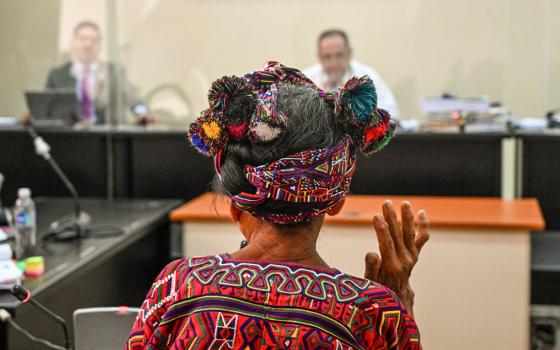

“At present we see indistinctly, as in a mirror, but then face to face” (1 Cor 13:12).
1 Cor 12:31—13:11; Luke 7:31-35
St. Paul’s image of seeing in a mirror, famously translated “through a glass darkly,” captures the gradual progress toward knowing God intimately that love offers us. We must grow into love, as a child grows toward maturity and self-knowledge. We must discern between real love and the many forms of power and insight, knowledge and eloquence that seem to promise perfection but only lead to pride. Only a love that is patient, kind, unselfish and forgiving endures when all other gifts pass away.
The mirror image has a deep biblical history. In Genesis, Creation occurs when the Spirit of God hovers over the waters and the divine face is reflected on the world. All of Creation therefore receives the image and likeness of God. Sin distorts this face-to-face encounter when humans worship themselves as gods, knowing good and evil. Redemption is possible only when humanity once again accepts the divine image, appearing fully in the person of Jesus, the first born of the New Creation. Those who are baptized in Christ reflect this image, which transforms us. We come to know ourselves as we gradually learn to see him as he is (1 John 3:2).
Poet Thomas Lynch captures this journey from falsehood to selfhood when he describes a moment we have all experienced, of catching ourselves in a mirror, reassuring ourselves that we exist with a quick glance of recognition. It is a changing image, a sly look when we know we are fooling no one with our practiced likeability, or a shock, to turn on the bathroom light and see my father’s face in the mirror, stripping me of youth.
Descartes’ proof for his existence: “I think therefore I am,” was another reflection in a mirror made into a foundation for his epistemology, but insufficient to save the later philosophers whose thinking led them to the edge and tumbled them into existential freefall. Only God, the ground of Being, can give us existence as creatures. And St. Paul affirms our dependence on God’s knowledge of us, that “I shall fully know as I am fully known” when I know God face to face as the source of my existence.
As children, we engaged one another in name-calling by repeating, “I know you are but what am I?” Jesus described skeptics who refused to acknowledge him or John the Baptist as from God as children quarreling in the marketplace. Refusing to play either a happy or sad game, they made their refusal the game. Maturity moves us beyond games to choose to know ourselves as we are. Masks and personas, avatars and roles fall way in the pursuit of authenticity and intimacy. God waits for us on the other side of the glass darkly, which admits us into the truth the more we make love our way of seeing and becoming ourselves before God.
Advertisement







